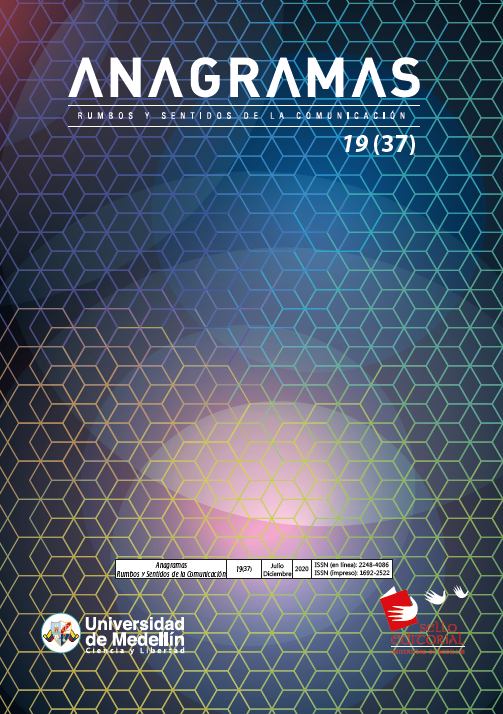Researching Gender Identity: Collective Representations, Communication and Language
Main Article Content
Abstract
From the inquire to the conceptual references that intervene and structure the studies on gender identity and the need to locate the, in the social and cultural contexts, as well as from the intention to establish a relationship with the collective representation and the contemporary languages, this study reviewed different conceptual axes through an exploration of diverse theoretical currents.
As a finding of this exploration, the study could identify mutations on the concepts, the paradigms and the communication flows that are configured through contemporaneity. The study makes evident the necessity for rethinking the usual classifications of modernity, i.e. overcome the binary categories for understanding gender. In this sense, it is necessary to take into account the communicative dimension implied by gender, no as a classificatory dimension of the human, but as a social and cultural process determined by the representations of each time and by its inherent communicative elements. Likewise, the study was able to establish a relation between three categories that allowed it to make evident contact points with gender identity studies through the collective representations of the territory, of fashion and identity, as well as from the social and cultural conditionings typical of the contemporary subject.
This research allowed the establishment of lines of analysis for basing the overcoming of taxonomical and anachronistic approaches that typify in a binary way the gender identity. It also allowed the identification of territory as a key factor in interpretation, of fashion as a direct variable from the mentalities point of view and dentity as a concept that works as a condition of possibility of the self-referentiality and the referentiality of the other in the subject. This way, it is possible to resignify practices from their existential experience with gender.
Article Details
References
Accorsi, S., Bejarano, G. S., Betancourt, G. A., Britto, D., Castellanos Llanos, G., Domínguez, M. y González, J. (2002). Género y sexualidad: en Colombia y en Brasil. La Manzana de la Discordia. Universidad del Valle.
Arango, M. (2017). El espacio viscoso: hacia un entendimiento del espacio como una producción social. Universidad Pontificia Bolivariana.
Auza, M. (2004). Ficciones y realidades de los estudios culturales. Flacso.
Bauman, Z. (2006). Vida líquida. Paidós.
Bauman, Z. (2008). Mundo Consumo. Paidós.
Beck, U. y Beck, E. (2003). Individualización. Paidós.
Campillo. A. (2015). Adiós al progreso, una nueva filosofía de la historia. Perspectivas Humanísticas Artículos, (1), 8-39.
Castells, M. (1999). La era de la información. Siglo XXI.
Castro, E. (2004). El vocabulario de Michel Foucault: un recorrido alfabético por sus temas, conceptos y autores.
Universidad Nacional de Quilmes.
Castro, F. y Vargas, V. (2020). Estrategias y metodologías de creación/comunicación. Fondo Editorial Colegiatura.
Cortina, A. (2002). Por una ética de consumo. Santillana.
Farji Neer, A. (2019). Biociudadanías trans: demandas e iniciativas frente al sistema de salud argentino (2012-2015). Athenea Digital, 19(1), 1-20.
Fedele, M., Masanet, M. J. y Ventura, R. (2019). Negotiating love and gender stereotypes: Prevalence of 'amor ludens' and television preferences rooted in hegemonic masculinity. Masculinities and Social Change,8(1),1-43. http://dx.doi.org/10.17583/mcs.2019.3742
Foucault, M. (1972). La arqueología del saber. Siglo XXI.
Foucault, M. (1980). El orden del discurso. Tusquets.
Giménez, G. (2005). La concepción simbólica de la cultura. Conaculta.
Gómez, M. y Mahecha, O. (1998). Espacio, territorio y región: conceptos básicos para un proyecto nacional. Cuadernos de Geografía, 7(2), 120-135.
Hall, S. (2000). ¿Quién necesita la identidad? Plaza y Valdés Editores.
Harvey, D. (2006). Space as a keyword. Science Library
Heath, J. y Potter, A. (2004). Rebelarse vende: el negocio de la contracultura. Taurus.
Inexmoda. (2020). Glosario textil y de moda. Inexmoda
Laval, C. y Dardot, P. (2013). La nueva razón del mundo. Gedisa.
Lencina, R. (2019). Ser Mujer Indígena en la Contemporaneidad: la Construcción de Múltiples y Diversas Identidades de Género desde una Perspectiva Etnográfica. Multidisciplinary Journal of Gender Studies, 8(2), 109-134. http://dx.doi.org/10.17583/generos.2019.4256
Lipovetsky, G. (2004). El lujo eterno. Editorial Anagrama.
Lipovetsky, G. (2006). La felicidad paradójica. Editorial Anagrama.
Lyotard, F. (1989). La condición posmoderna. Cátedra.
Moragas, M. (2011). Interpretar la comunicación. Alianza.
Muñoz, A. (2019). Los experimentos mentales como género literario en el debate sobre identidad personal Daimon. Revista Internacional de Filosofía, (77), 89-104.
Navarrete-Cazales, Z. (2015). ¿Otra vez la identidad? Un concepto necesario pero imposible. Revista Mexicana de Investigación Educativa, 20(65), 461-479.
Ramírez, E. (2013). Libia Posada: cartografías del sentir. Revista de Arte y Diseño, (11), 38-41.
Real Quintanar, T., Robles García, R., Medina-Mora, M. E., Jorge, J. C. y Vázquez Pérez, L. (2018). Transgender identi-ty y cryptorchidism: A case study. Salud Mental, 42(1), 51-57.
Ríos, A. (2002). Los estudios culturales y el estudio de la cultura en América Latina. Universidad Central de Venezuela.
Santos, M. (2000). La naturaleza del espacio: técnica y tiempo, razón y emoción. Plaza Edición. Tanupriya y Pannikot, D. (2018). Production of Gender: A Study on Performativity in Female-To-Male Transsexuals. Masculinities and Social Change, 7(3),255-278. http://dx.doi.org/10.17583/mcs.2018.3607
Veblen, T. (1974). Teoría de la clase ociosa. Fondo de Cultura Económica.





